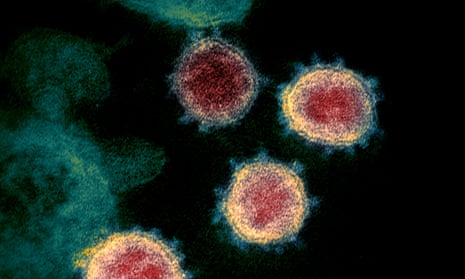The world’s first coronavirus human challenge study will begin in the UK in a matter of weeks, following approval from the country’s clinical trials ethics body, the business department said.
Approval has been given for an initial trial that will involve up to 90 carefully screened, healthy, adult volunteers aged between 18 and 30. They will be exposed to the coronavirus in a safe, controlled environment. It is hoped further trials will follow.
“These are quite unique studies, able to accelerate not only understanding of diseases caused by infection, but also to accelerate the discovery of new treatments and of vaccines,” said Peter Openshaw, a professor of experimental medicine at Imperial College London.
Young, healthy, volunteers are being recruited as they are known to be at low risk of complications from the virus. Openshaw said the safety of volunteers was paramount: “None of us want to do this if there is any appreciable risk”
The human challenge study involves a consortium that includes the government’s vaccines taskforce, Imperial College London, the Royal Free London NHS foundation trust, and the clinical company hVIVO.
The initial trial, which will start within a month, aims to establish the smallest amount of virus needed to cause infection – rather than symptoms.
After passing screening tests, participants will be asked to go into quarantine at the Royal Free hospital in London. The virus is given two days later via drops in the nose. After exposure participants will be monitored 24 hours a day for at least 14 days, with blood samples and nose swabs taken every day.
“We will be asking people to test their smell using scratch and sniff cards,” said Chris Chiu, a doctor at Imperial College London, who is the study’s chief investigator. Participants will also be asked to do cognitive tests.
After discharge the participants will continue to be followed up over a year so that researchers can monitor any long-lasting symptoms. Participants are expected to be offered about £4,500 compensation for their involvement over the entire year.
The team said the virus used in the initial trial would be the variant that was circulating in the UK in last summer, manufactured to medical grade, rather than any variant recently emerged.
But Andrew Catchpole, the chief scientific officer at hVIVO, said the trials could later be applied to other variants, adding that it would take three to four months to manufacture a new variant.
The team said they hoped the initial trial would give experts a greater understanding of Covid-19, such as which factors of the immune response offered protection against infection, how the virus was transmitted, and how much virus was shed by young, healthy people with few symptoms.
People interested in taking part can contact the UK Covid Challenge website. The team said they needed people who had not previously been exposed to the virus.
The study has been supported by £33.6m of investment from the UK government, and after the initial trial it is hoped the study will move on to expose to the virus participants that have received Covid vaccines. However, the team has not yet applied to the Health Research Authority for approval for those trials.
Prof Robert Read of Southampton Biomedical Research Centre said such work would prove valuable, particularly given the emergence of new variants of the coronavirus, and the likelihood that booster vaccines would be needed to protect against them.
“One of the important reasons for wanting to do this study is that it is the fastest way to evaluate novel vaccines,” he said.
One issue is that as the epidemic is brought under control the incidence of infections caught in regular settings will decline, making it difficult to evaluate the efficacy of new vaccines through traditional clinical trials.
“A human challenge allows you to vaccinate volunteers and then infect them in a controlled way with the virus to compare perhaps new vaccines with first-generation vaccines to provide information to the regulatory authorities so that they can understand the potential of novel vaccines head to head with the established vaccines that already exist,” said Read.
Such trials could also help improve current Covid vaccines, shed light on the best dose size and the length of interval between doses, and provide insights into when booster shots might be needed.
Read added that challenge trials would also offer a platform for testing new treatments, noting that once the epidemic had died down there would not be enough cases for the testing of medications.
Challenge trials are not new. The approach has previously played a role in the development of treatments for cholera and influenza.
The business secretary, Kwasi Kwarteng, said the study was an important element in efforts to tackle Covid. “While there has been very positive progress in vaccine development, we want to find the best and most effective vaccines for use over the longer term,” he said.
He added: “These human challenge studies will take place here in the UK and will help accelerate scientists’ knowledge of how coronavirus affects people and could eventually further the rapid development of vaccines.”
Chiu said:“Our eventual aim is to establish which vaccines and treatments work best in beating this disease, but we need volunteers to support us in this work.”
